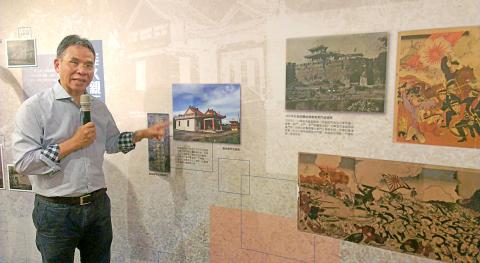An exhibition titled “Archival Exhibition on Inverting 1895: 120 Years After the War of Yi-We” (鉅變一八九五—乙未之役.一百二 十年檔案特展), which examines both resistance to and acceptance of Japanese colonial rule is currently being hosted by the Academia Sincia in Taipei.
The War of Yi-Wei (乙未之役), referring to the name of the year in the Chinese lunar calendar, is the Chinese term for the five-month war in 1895 between Empire of Japan and anti-Japanese insurgents who rose up after the Republic of Formosa declared independence in response to Japan’s annexation of the formerly insular Qing province.
Academia Sinica’s Institute of Taiwanese History director Hsieh Kuo-Hsing (謝國興), whose institute jointly organized the exhibition with the Academia Sinica’s Digital Center, said the exhibition is named “Inverting 1895” because it focuses on reversing nationalist historiography that focuses solely on resistance.

Photo: Tang Chia-ling, Taipei Times
The prevalent Han-Chinese nationalist perspective is simplistic and distorts historical fact, he said.
“In order to give full justice to history’s complexity, the interpretation of the past must proceed from the original documents and texts, instead of textbooks,” Hsieh said.
Most of the island’s inhabitants chose to accept Japanese rule in 1895 in order to survive, he said.
“There are multiple strategies to achieving survival, and welcoming Japanese rule was a viable alternative to resistance,” Hsieh said, adding that denouncing people for being “obsequious” to Japan or the Qing Dynasty is prejudicial and narrow-minded.
Hsieh said there are other narratives the exhibition aims to subvert. For example, he called the Republic of Formosa’s founding “a pretext” that has little to do with Taiwanese independence, but a “stratagem to thrust the Japanese annexation of Taiwan onto the international stage.”
Hsieh said the strategy backfired because no nation expressed interest in an intervention, and Formosa Republic officials, including its president Tang Ching-sung (唐景崧), fled.
“The only people who resisted Japan courageously were ordinary citizens. All of the officials had turned tails,” he said.
After the First Sino-Japanese War, Japan included in the Treaty of Shimonoseki articles that, in addition to annexing Taiwan, gave its inhabitants two years to decide whether to sell their property and leave or to remain in Taiwan under Japanese rule, Hsieh said. About 6,000 people emigrated, or only about one person in 1,000 in relation to the pre-war population, Hsieh said.
“Historians of Taiwan by consensus consider ‘Japanese rule’ (日治) to be better as a term of periodization because it reflects the epoch’s historical reality and is more neutral, while ‘Japanese occupation’ (日據) is far less supported by evidence, since Japanese rule was not based on a forceful military occupation,” Hsieh said.
After the end of the war, inhabitants of Taiwan received internal passports that identified them as “new subjects” (新臣民), while Japanese citizens were identified as “civilians” (平民), he said.

An essay competition jointly organized by a local writing society and a publisher affiliated with the Chinese Communist Party (CCP) might have contravened the Act Governing Relations Between the People of the Taiwan Area and the Mainland Area (臺灣地區與大陸地區人民關係條例), the Mainland Affairs Council (MAC) said on Thursday. “In this case, the partner organization is clearly an agency under the CCP’s Fujian Provincial Committee,” MAC Deputy Minister and spokesperson Liang Wen-chieh (梁文傑) said at a news briefing in Taipei. “It also involves bringing Taiwanese students to China with all-expenses-paid arrangements to attend award ceremonies and camps,” Liang said. Those two “characteristics” are typically sufficient

A magnitude 5.9 earthquake that struck about 33km off the coast of Hualien City was the "main shock" in a series of quakes in the area, with aftershocks expected over the next three days, the Central Weather Administration (CWA) said yesterday. Prior to the magnitude 5.9 quake shaking most of Taiwan at 6:53pm yesterday, six other earthquakes stronger than a magnitude of 4, starting with a magnitude 5.5 quake at 6:09pm, occurred in the area. CWA Seismological Center Director Wu Chien-fu (吳健富) confirmed that the quakes were all part of the same series and that the magnitude 5.5 temblor was

The brilliant blue waters, thick foliage and bucolic atmosphere on this seemingly idyllic archipelago deep in the Pacific Ocean belie the key role it now plays in a titanic geopolitical struggle. Palau is again on the front line as China, and the US and its allies prepare their forces in an intensifying contest for control over the Asia-Pacific region. The democratic nation of just 17,000 people hosts US-controlled airstrips and soon-to-be-completed radar installations that the US military describes as “critical” to monitoring vast swathes of water and airspace. It is also a key piece of the second island chain, a string of

The Central Weather Administration has issued a heat alert for southeastern Taiwan, warning of temperatures as high as 36°C today, while alerting some coastal areas of strong winds later in the day. Kaohsiung’s Neimen District (內門) and Pingtung County’s Neipu Township (內埔) are under an orange heat alert, which warns of temperatures as high as 36°C for three consecutive days, the CWA said, citing southwest winds. The heat would also extend to Tainan’s Nansi (楠西) and Yujing (玉井) districts, as well as Pingtung’s Gaoshu (高樹), Yanpu (鹽埔) and Majia (瑪家) townships, it said, forecasting highs of up to 36°C in those areas